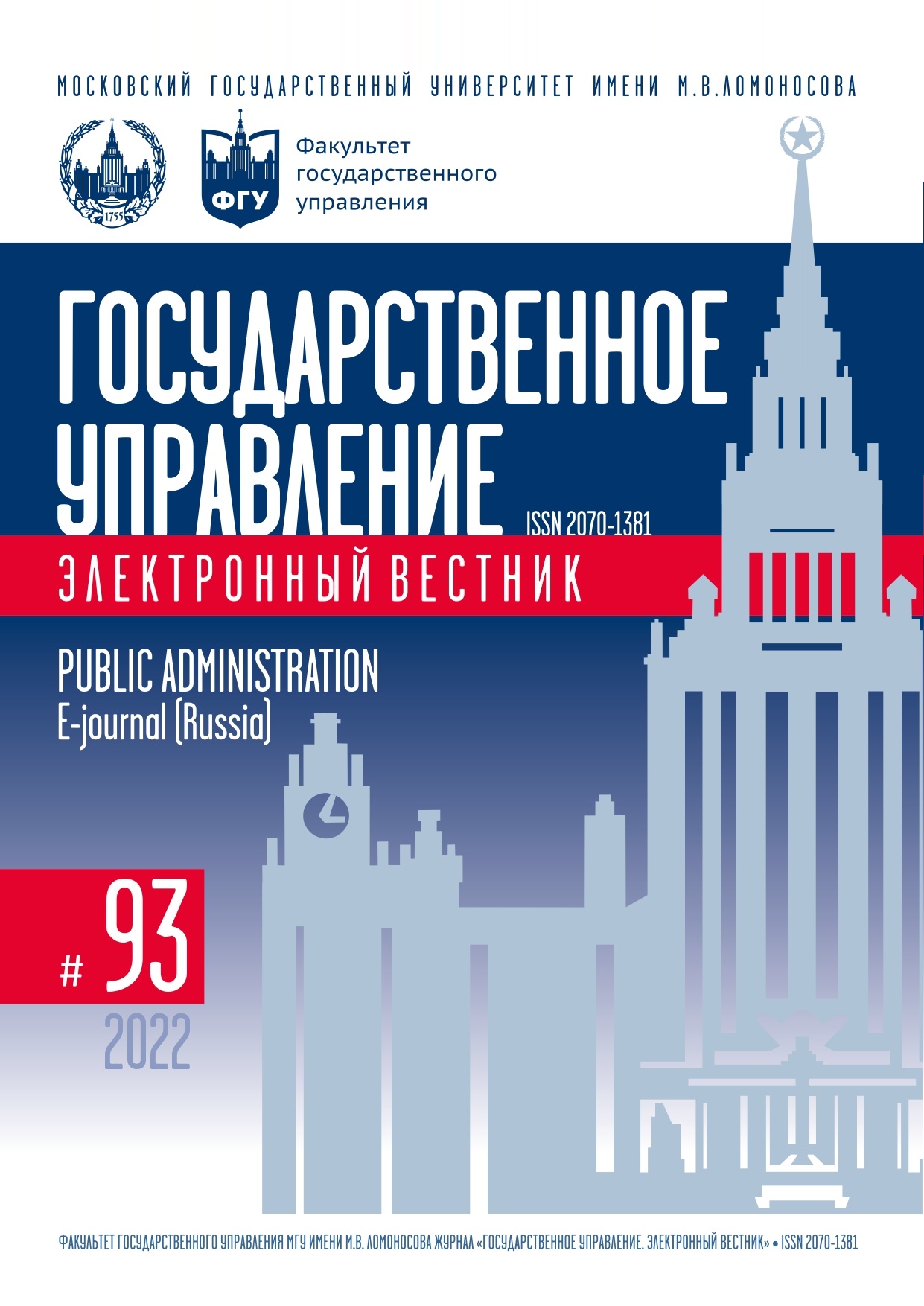Systemic Constructs of International Security: Societal Change Agents as Conflict Resolution
Keywords:
International security, social development, inequality, military risk, conflict resolution, elitology, military studiesAbstract
This article proposes systemic constructs of international security (SCIS) to determine the degree of international tensions in the world, based on several types of data: indicators on the social development of states; the degree of resource concentration amongst elites; military and information power. The research methodology includes a systemic approach that makes explicit the interrelation of economic, political, social, and military factors, thereby producing a stabilization or destabilization of the international situation. In assessing the increasingly complex reality of international security, a dialectical method was used. SCIS can be defined as the minimum set of interrelated parameters of the state (economic, political, military, cultural, scientific, environmental), keeping them in a ratio that meets the demands of social development while minimizing the risks of destabilizing social systems. Finally, the authors made a preliminary SCIS assessment for six countries: five (China, France, Russia, the United Kingdom, and the United States) have officially announced successful nuclear weapons tests. The sixth, India, has a nuclear program as well as significant economic potential and the second largest population in the world. Based on the analysis, the authors offer proposals for determining a state’s military danger index. The task of democratic institutions is to develop and improve an analytical model so as to combine the monitoring of dangerous trends with practical readiness to overcome them globally. The question of what socio-political actors can provide for the SCIS is open for discussion.
References
Базаркина Д.Ю. Эволюция подходов к противодействию гибридным угрозам в стратегическом планировании ЕС // Современная Европа. 2021. № 6 (106). С. 133–143. DOI: 10.15211/soveurope62021133143
Пашенцев Е.Н. Провокация как элемент стратегической коммуникации США: опыт Украины // Государственное управление. Электронный вестник. 2014. № 44. С. 149–175.
Bergsten C.F. The United States vs. China: The Quest for Global Economic Leadership. Cambridge, Melford: Polity Press, 2022.
Bongiovanni F. The Decline and Fall of Europe. Hampshire, UK: Palgrave Macmillan, 2012.
Bulmer-Thomas V. Empire in Retreat: The Past, Present, and Future of the United States. New Haven: Yale University Press, 2018.
China’s Global Engagement: Cooperation, Competition, and Influence in the 21st Century / ed. by J. deLisle and A. Goldstein. Washington, DC: Brookings Institution Press, 2017.
Crosston M., Pashentsev E. Russian Security Cannot Be Anti-Russian // The Russian International Affairs Council (RIAC). 2022. URL: https://russiancouncil.ru/en/analytics-and-comments/analytics/russian-security-cannot-be-anti-russian/
Erler E. The United States in Crisis: Citizenship, Immigration, and the Nation State. New York, London: Encounter Books, 2022.
Giles K., Ellis R. The Rise of Russia — The Turning Point for Russian Foreign Policy. Praha: Madison & Adams Press, 2017.
Marche S. Next Civil War: Dispatches from the American Future. New York: Simon & Schuster, 2022.
Pashentsev E. About the Constructs of International Security: Myth or Future Realities of International Relations (manuscript) // Research Seminar by International Center for Socio-Political Studies and Consulting (ICSPSC). Moscow, January 17, 2022a.
Pashentsev E. The US Strategic Provocations before and during the Olympic Games: The Stakes Are Growing. Moscow: International Center for Social and Political Studies and Consulting, 2022b.
Petras J. US Imperialism: The Changing Dynamics of Global Power (Globalization, Crises, and Change). New York, Abingdon: Routledge, 2019.
Theorising the Crises of the European Union / ed. by N. Brack, S. Gürkan. Abingdon: Routledge/Taylor & Francis Group, 2021.
Walter B. How Civil Wars Start: And How to Stop Them. New York: Crown, 2022.
Downloads
Published
Similar Articles
- Matvei N. Chistikov, Anna A. Shuranova, International Regimes as a Factor of Interstate Bilateral Relations (the Case of Russia and Norway) , Public Administration. E-journal (Russia): No. 95 (2022)
- Nikolay V. Gorin, Boris K. Vodolaga, Vladimir P. Kuchinov, Vladimir V. Shidlovskiy, Nuclear Energy as а Basis for Sustainable Development , Public Administration. E-journal (Russia): No. 95 (2022)
- Olga A. Voronina, Gender Mainstreaming as Methodology in Social Policy , Public Administration. E-journal (Russia): No. 100 (2023)
- Anton P. Khlopko, Evolution of CSTO Bodies’ Structure in the Context of Transformation of Military and Political Situation in the Post-Soviet Space , Public Administration. E-journal (Russia): No. 107 (2024)
- Elena E. Shestakova, Social Policy for Human Development: World Experience , Public Administration. E-journal (Russia): No. 85 (2021)
- Xi Fuyuan, Alla Z. Bobyleva, Anastasiia V. Baraboshkina, Global Transformations: Trends towards Increasing Instability and Sustainable Development Drivers in Current Situation , Public Administration. E-journal (Russia): No. 103 (2024)
- Irina S. Semenenko, Civilizational Identity and the Identity Politics Agenda: Russian Priorities in a Transforming World Order , Public Administration. E-journal (Russia): No. 104(S) (2024): The Concept of Russian Civilization: New Trends in Scientific Discussions
- Li Minhan, Tools for Stimulating Development of Cross-Border Online Business in the Interests of Strengthening the EAEU and BRICS Integration , Public Administration. E-journal (Russia): No. 110 (2025)
- Eugenia V. Andryushina, Infodemic as a Factor of Social Security and Anti-Infodemic Policy , Public Administration. E-journal (Russia): No. 95 (2022)
- Natalya I. Kharitonova, Alexey S. Maksimov, Russia’s Interaction with Key Geopolitical Opponents in Hybrid War: An Integrated Strategic Approach , Public Administration. E-journal (Russia): No. 95 (2022)
You may also start an advanced similarity search for this article.




